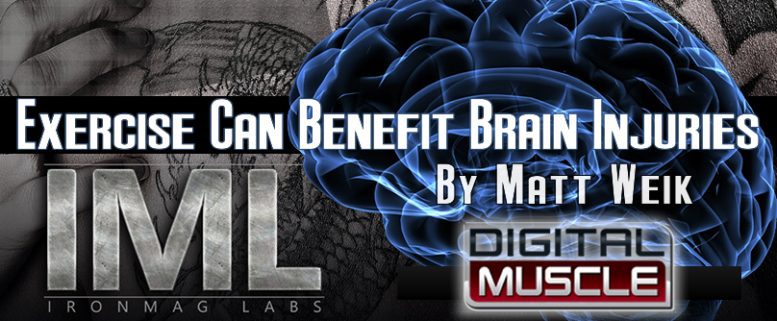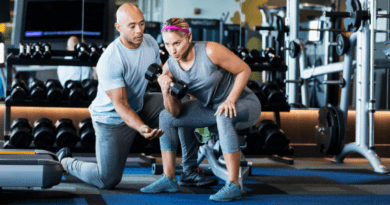Can Exercise Benefit Brain Injuries?
When you think of concussions and other brain injuries, you generally think about contact sports like football to be the cause. While this is true, concussions can happen to anyone without having to get hit by a 285-pound linebacker. A car accident, falling down and hitting your head, and several other “accidental” knocks to your head can cause a concussion and brain injuries. For years research has been touting the best way to recover after brain injuries is to completely rest until you are symptom-free. A new study shows another way to potentially speed up the recovery process and minimize the side effects.
What Are Brain Injuries?
Brain injuries, also known as traumatic brain injuries (TBIs), refer to damage or injury to the brain that can result from a variety of causes. These injuries can range from mild to severe and can have a wide range of effects on an individual’s physical, cognitive, and emotional functioning.

What Are the 3 Types of Brain Injuries?
Here are some common causes and the three common types of brain injuries:
- Traumatic Brain Injury (TBI): These injuries are caused by a sudden and violent blow or jolt to the head or body. TBIs can be classified into three categories:
- Mild TBI (Concussion): This is the most common type of TBI and often results in temporary cognitive and physical impairments.
- Moderate TBI: This type of injury can cause more significant brain damage and long-term consequences.
- Severe TBI: Severe TBIs can result in extensive brain damage and have life-altering effects.
- Non-Traumatic Brain Injury: These injuries are not caused by external physical force but can still result in brain damage. Common causes include stroke, brain tumors, infections, and oxygen deprivation (e.g., from drowning or suffocation).
- Acquired Brain Injury (ABI): ABIs are brain injuries that occur after birth, and they can result from various medical conditions, such as a lack of oxygen, infection, or certain diseases like Alzheimer’s or Parkinson’s.
The symptoms and effects of a brain injury can vary widely depending on the severity and location of the damage. Common symptoms and consequences of brain injuries may include:
- Cognitive impairments: Memory problems, difficulty concentrating, and impaired reasoning and problem-solving abilities.
- Physical impairments: Weakness, paralysis, loss of coordination, and difficulty with balance and motor skills.
- Emotional and behavioral changes: Mood swings, depression, anxiety, impulsivity, and changes in personality.
- Sensory disturbances: Changes in vision, hearing, taste, or smell.
- Communication difficulties: Difficulty with speech, language, or understanding spoken or written words.
Recovery from a brain injury can vary widely, and it may involve rehabilitation, medical treatment, and support from healthcare professionals, family, and friends. The extent of recovery depends on the severity of the injury and the effectiveness of the treatment and rehabilitation efforts. Some individuals may experience long-term or permanent effects from a brain injury, while others may make significant progress in their recovery. Early diagnosis and intervention are crucial in optimizing outcomes for individuals with brain injuries.
How Can You Recover from These Injuries?
Recovery from a brain injury can be a complex and lengthy process, and it often depends on the severity and type of injury, as well as individual factors. Here are some key components and strategies involved in the recovery process:
- Medical Treatment: Immediate medical attention is essential after a brain injury. This may involve stabilizing the patient, addressing any life-threatening conditions, and ensuring that the brain receives adequate oxygen and blood flow. Surgery may be necessary in some cases to remove blood clots, repair damage, or relieve pressure on the brain.
- Rehabilitation: Rehabilitation is a critical part of recovery for many individuals with brain injuries. Depending on the specific impairments, rehabilitation programs may include:
- Physical Therapy: To improve strength, coordination, and mobility.
- Occupational Therapy: To regain independence in daily activities such as dressing, eating, and bathing.
- Speech and Language Therapy: To address communication and swallowing difficulties.
- Cognitive Rehabilitation: To address memory, attention, problem-solving, and other cognitive deficits.
- Psychological Counseling: To help individuals cope with emotional and behavioral changes.
- Medications: Medications may be prescribed to manage symptoms and complications associated with brain injuries, such as pain, seizures, spasticity, depression, anxiety, and sleep disturbances.
- Assistive Devices: Depending on the extent of physical impairments, individuals may benefit from assistive devices such as wheelchairs, orthotic devices, communication aids, or adaptive technology to improve their quality of life and independence.
- Psychological and Emotional Support: Coping with the emotional and psychological challenges that often accompany brain injuries is crucial. Counseling, support groups, and therapy can help individuals and their families manage stress, depression, anxiety, and changes in behavior.
- Nutrition and Lifestyle: Maintaining a healthy lifestyle with proper nutrition, hydration, and regular exercise can support recovery. Avoiding alcohol and tobacco is also important, as these substances can negatively impact brain healing.
- Supportive Environment: A supportive and caring environment at home and in the community can significantly aid recovery. Family and friends can provide emotional support and help individuals with brain injuries adapt to daily life.
- Follow-Up Care: Regular follow-up appointments with healthcare providers are important to monitor progress, adjust treatment plans, and address any new or ongoing issues.
It’s important to note that the recovery process for brain injuries can be highly individualized, and there is no one-size-fits-all approach. Some individuals may experience significant improvement and regain a high level of functioning, while others may face ongoing challenges. Patience, perseverance, and a strong support system are key factors in the recovery journey. Rehabilitation and treatment plans should be tailored to the individual’s specific needs and goals to maximize their chances of recovery and quality of life.
Can Exercise Help Brain Injuries?
Contrary to popular belief, some are now suggesting that the best treatment for concussions is no longer rest. In fact, it’s actually the complete opposite. New research is showing that exercise done within seven days of brain injuries lessens the symptoms associated with concussions, thus cutting the recovery time down.
A team of researchers worked with a group of children between the ages of 5 and 18 who had suffered a concussion and visited a hospital in Canada. Each was given a survey and asked after their concussion how quickly they resumed their normal physical activity and how they felt at that time. 58% of the children who were still suffering from the side effects resumed activity within the first week. 76% of the whole group that was surveyed went back to their normal physical activities within two weeks. This goes against doctor’s recommendations but the findings were intriguing that they showed these individuals actually recovered faster and had fewer symptoms associated with concussions when they resumed activity before their symptoms subsided.
To be clear, the children didn’t resume activities that would put them at risk of re-injuring their brain again like going back to playing contact sports. One researcher from the study mentioned that he believes “light aerobic activity like walking, swimming or stationary cycling might emerge as a beneficial recommendation after further study.”
Click here to continue reading…


*Disclosure: This article may contain affiliate links or ads, which means we earn a small commission at no extra cost to you if you make a purchase through these links. These commissions help support the operation and maintenance of our website, allowing us to continue producing free valuable content. Your support is genuinely appreciated, whether you choose to use our links or not. Thank you for being a part of our community and enjoying our content.
PLEASE CONSIDER SHARING THIS ON YOUR SOCIAL MEDIA TO HELP OTHERS LEARN MORE ABOUT THIS TOPIC.





